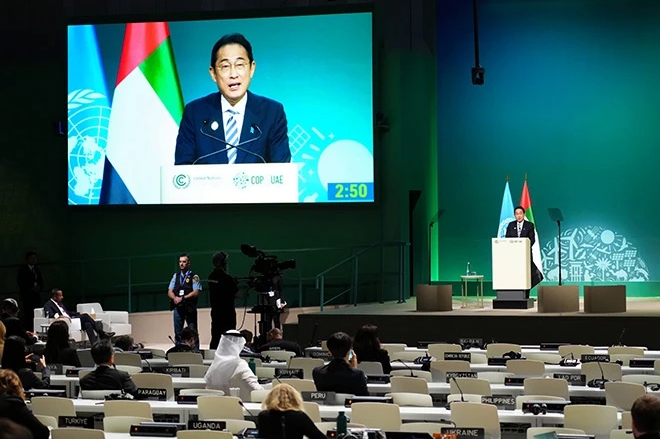
Prime Minister Fumio Kishida delivers an address Dec. 1 during the COP28 U.N. climate conference in Dubai. (Pool)
DUBAI--Japan found itself the odd man out at the recently ended COP28 U.N. climate conference here.
In short, the meeting that wound up Dec. 13 highlighted Japan’s reliance on coal despite a landmark agreement at the meeting to “transition away” from fossil fuels.
The deal appears to have had a significant impact on Tokyo, given that it lags far behind other countries on this issue without any hint of plans to make a meaningful review to lower its carbon footprint before the 2030 deadline.
Of all fossil fuels, coal is the worst offender when it comes to carbon dioxide (CO2) emissions.
It accounts for 70 percent of electricity-related emissions the world over. In Japan’s case, around 30 percent of its energy requirements come from coal.
Not surprisingly, coal is often cited as one of the fossil fuels from which nations must transition away as quickly as possible in relation to other listed resources.
Japan stood out with its failure at COP28 to join the Powering Past Coal Alliance (PPCA), a coalition of countries transitioning from coal that is led by Britain and Canada.
The PPCA obliges developed countries to abandon coal power generation by 2030. The tight deadline was behind Japan’s decision not to join the coalition.
Even the United States, which relies on coal for about 20 percent of its electricity needs, has announced its participation in the PPCA, leaving Tokyo the sole holdout among Group of Seven members.
On top of that, Japan did not embrace a new initiative by the United States and France to bring an end to private investments in coal businesses with the aim of assisting in local areas’ shift to green energy sources.
Prime Minister Fumio Kishida stated at COP28 that Tokyo “will end new construction of domestic unabated coal power plants.”
But only two coal facilities are planned or are under construction right now. In the meantime, as many as 170 coal plants are in operation.
Kishida’s stance suggests Tokyo is looking to rely on coal power as long as possible. Japan’s plan is applying trial-stage technology to co-fire ammonia and coal together in the hope the nation’s facilities will fall into the category of establishments with proper emission reduction measures that are referred to as an exception to decommission under the COP28 agreement.
As it stands, Tokyo’s basic energy plan shows that coal power will account for around 20 percent of all electricity sources in fiscal 2030.
Not surprisingly, Japan received the “Fossil of the Day” satirical award on two occasions during the conference. It is conferred by a nongovernmental organization on countries that are backward-looking in their endeavors to combat global warming.
Tokyo had no success in taking the initiative in talks, either.
During late night discussions between national representatives on Dec. 11, a group of island states as well as Colombia, the EU and Britain called for the inclusion of much stronger phrases toward the elimination of fossil fuels. However, Japan declined to comment on the wording regarding fossil fuels.
The first president’s draft of COP28 was released the same day.
JAPAN SLOW TO ACT
Japan will likely stick to its guns on this issue for the foreseeable future.
The COP28 agreement stipulates that renewable energy should triple by 2030 throughout the world. Each nation is supposed to contribute to this global commitment, along with other goals.
Observers said it is essential for Tokyo to reflect on the latest outcome ahead of discussions that will start in 2024 to develop a new basic energy plan and an emissions reduction target for 2035.
Despite that, Environment Minister Shintaro Ito told reporters at the conclusion of COP28 that it “seemingly does not look at literally zero fossil fuels whereas we will be transitioning promptly in 10 years to come.”
Ito simply vowed to “lessen the percentage of fossil fuels as much as possible.”
A representative of the Ministry of Economy, Trade and Industry suggested the international community’s agreement does not affect the existing course of action and that Japan will stick to co-firing of ammonia and coal and other conventional countermeasures for the foreseeable future.
“We understand that no more steps are required,” said the ministry official. “The agreement fully supports what Japan has been doing.”
Yukari Takamura, a legal professor at the University of Tokyo, who specializes in tracking international negotiations over global warming, argued the world’s agreement expects more from Tokyo.
“The latest decision points to what countermeasure the global community should take and urges nations to accelerate their efforts,” she said. “What Japan is bound to do is work out a novel emission cutting goal, with an eye on contributing to the exit from fossil fuels and the tripling of renewable energy across the world.”